Key takeaways:
- Understanding child safeguarding laws requires ongoing education and a sense of responsibility to protect vulnerable children.
- Documenting incidents accurately and systematically is crucial for building a strong case in legal disputes.
- Seeking legal advice provides clarity and support, helping to navigate complex emotions and legal jargon effectively.
- Active listening and focusing on the child’s best interests are essential for productive negotiation during dispute resolution.
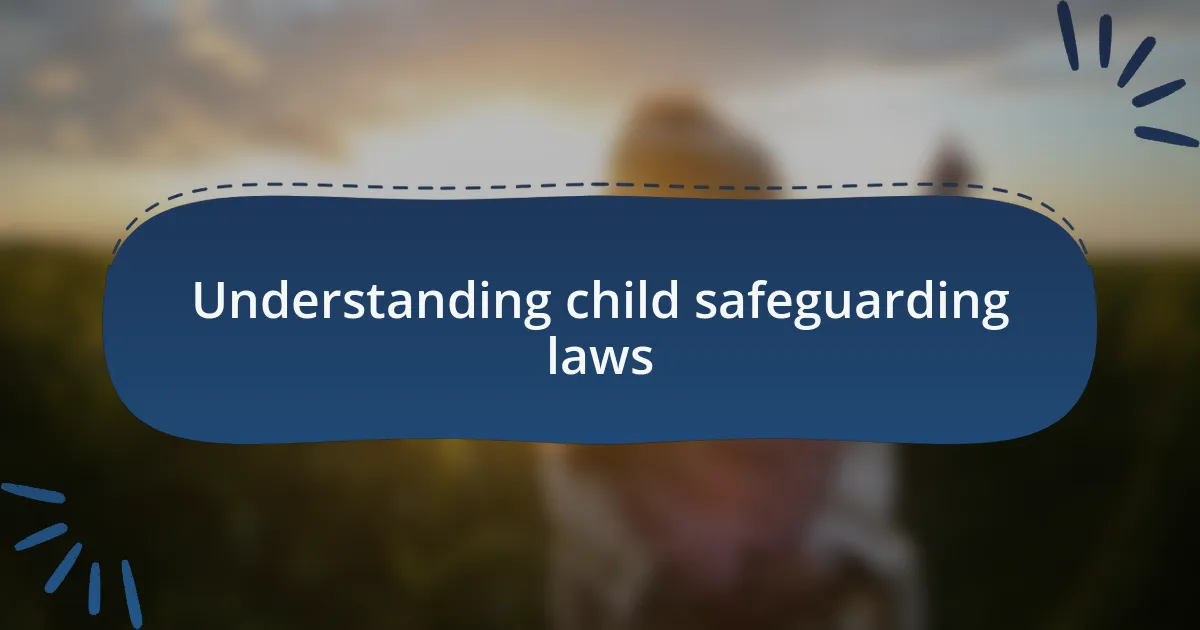
Understanding child safeguarding laws
Understanding child safeguarding laws can often feel overwhelming, yet they serve as essential frameworks to protect our most vulnerable members of society. I recall reading about a case where a community rallying around a potential victim helped to shine a spotlight on the importance of these laws. It made me wonder—how often do we, as caretakers and advocates, truly grasp the full extent of our legal responsibilities?
These laws exist to provide clear guidelines on how to respond when a child is at risk, but they are not static; they evolve to reflect societal values. When I participated in a training session on safeguarding, I was struck by the diverse perspectives shared by attendees. Hearing their stories made me realize the emotional weight of these issues and the urgent need for adherence to the law—not just out of obligation, but out of compassion for those we are tasked to protect.
Have you ever considered what your role is in this complex web of legal protections? Understanding the nuances of child safeguarding laws requires ongoing education and a willingness to advocate for change. In my experience, it has often been the most informed voices that bring about real transformation, reminding us that knowledge is not just power; it is a responsibility we share to ensure every child grows up safe.
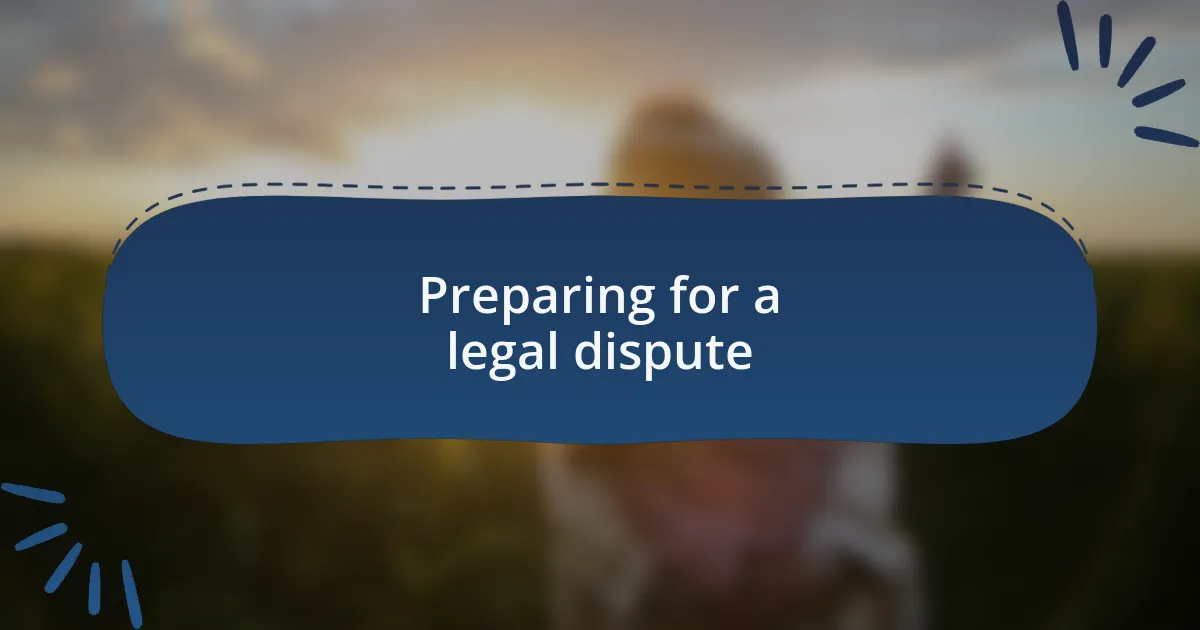
Preparing for a legal dispute
Preparing for a legal dispute can be daunting, especially when it involves the welfare of children. I remember standing in front of my laptop, reviewing documents late into the night, feeling the weight of my responsibilities. Have you ever felt that sense of urgency, knowing that the decisions made today could shape the future for a vulnerable child?
Gathering evidence is crucial in these situations. In my case, I meticulously cataloged reports, correspondences, and even witness accounts, knowing that each piece contributed to the bigger picture. It’s incredible how the smallest detail can sometimes turn the tide, transforming a vague recollection into a pivotal point in the dispute. Have you taken the time to sort through your resources? Every moment spent preparing can empower your case.
Equally important is consulting legal expertise. I distinctly remember feeling overwhelmed by the legal jargon during my first consultation, but I soon realized that having a skilled attorney was like having a trusted guide through a complex maze. This support not only clarified my options but also provided reassurance during a chaotic time. Who in your professional network might you reach out to for guidance as you prepare?
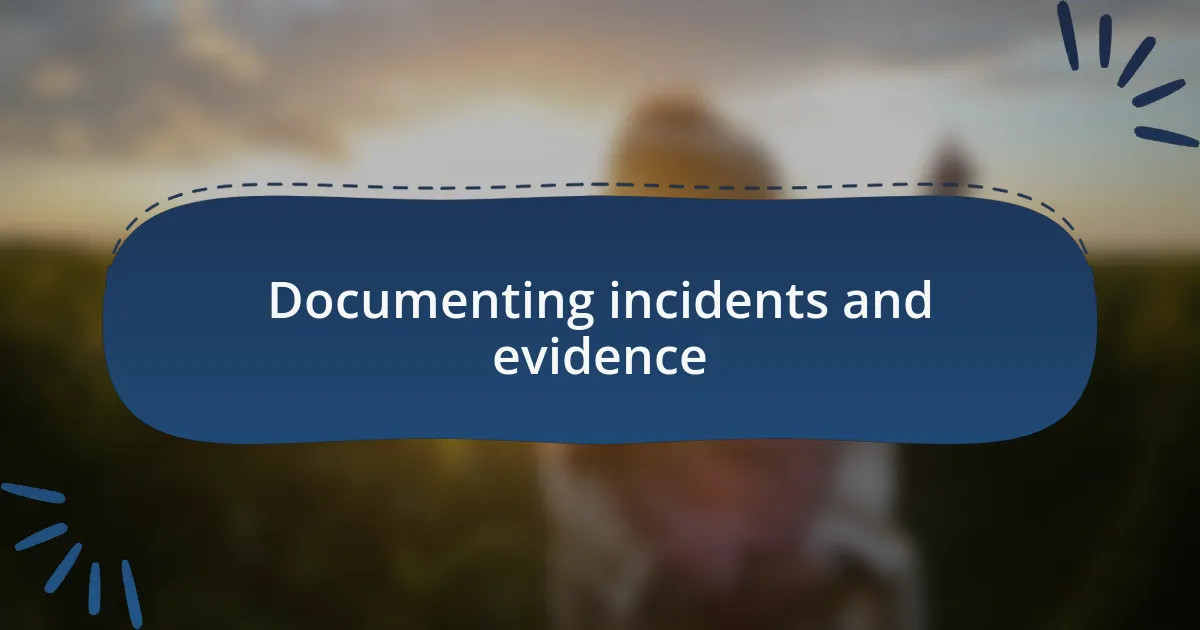
Documenting incidents and evidence
Documenting incidents and evidence is not just about jotting things down; it’s a critical step that can influence outcomes significantly. I recall an incident where I witnessed a troubling interaction that I initially brushed off, thinking it wasn’t my place to intervene. Later, however, I realized that I needed to document exactly what I saw, including the date, time, and context. Have you ever hesitated to record something because it seemed minor, only to find it was more important than you thought?
In my experience, having a systematic approach to documentation helped immensely. I started to create a dedicated folder for each case, placing all relevant materials in chronological order. This organization allowed me to present a clear timeline, making it easier for my legal counsel to understand the nuances of the situation. Imagine the difference it makes when your information is structured, rather than scattered and haphazard.
Moreover, taking the time to gather firsthand accounts from others can amplify your position. I remember reaching out to colleagues who had also witnessed the troubling behaviors – their observations added depth and credibility to my documentation. It felt empowering to know that I wasn’t alone in my concerns. Have you thought about who around you might be able to provide a similar perspective? Each voice can contribute significantly to building a comprehensive narrative that underscores the urgency and seriousness of the issue at hand.
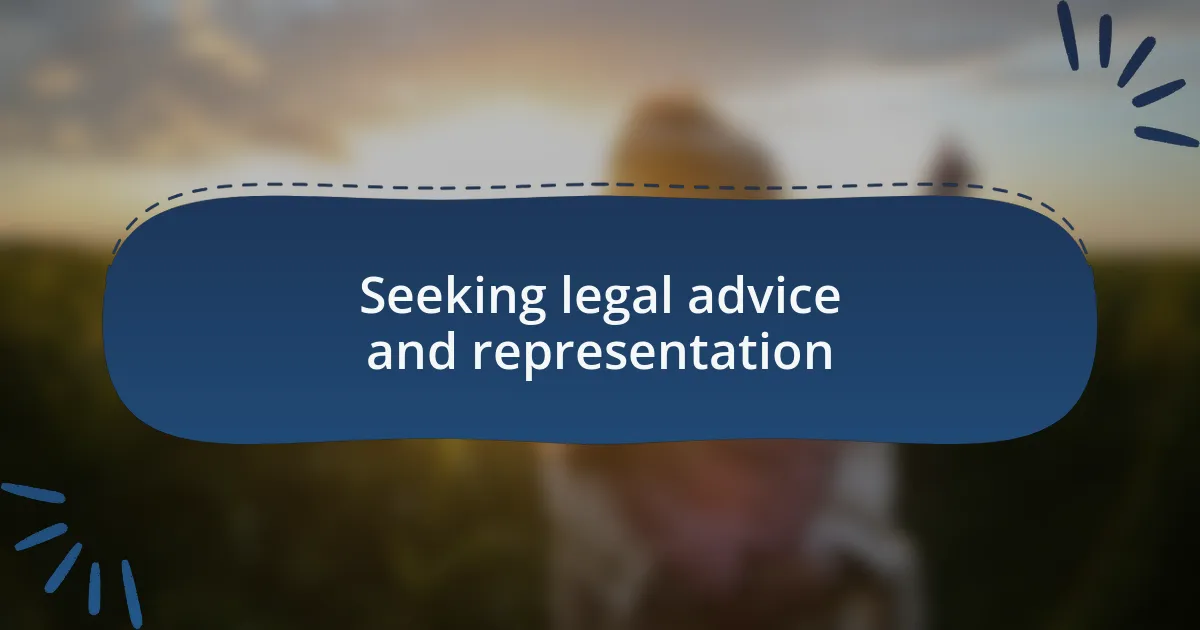
Seeking legal advice and representation
Seeking legal advice was a pivotal moment for me during the dispute I faced. I remember the anxiety that accompanied my decision to reach out to a lawyer, unsure if I was even handling the situation correctly. Had I waited too long? As it turned out, having a knowledgeable attorney by my side provided me with both clarity and confidence. They navigated the complexities of the law while I focused on what mattered most—ensuring the child’s safety.
When I first met with my attorney, I was surprised by how much they emphasized the importance of preparation. They wanted to know every detail, encouraging me to articulate my concerns and the specifics of my experiences. It felt daunting at first, almost like I was unearthing painful memories. However, I soon realized that this process was essential. Engaging a professional who understood the intricacies of child safeguarding laws made it easier for me to confront my fears and strategize effectively.
Choosing the right legal representation also meant finding someone who would listen to my perspective while advocating fiercely for the vulnerable. I recall having initial consultations with different lawyers, gauging their understanding of my situation and values. It’s critical to remember that your lawyer becomes your voice; they represent not only your interests but also amplify the voices of those who cannot speak for themselves. Have you found someone who resonates with your cause? The right fit can make all the difference in feeling supported and secure throughout the legal process.
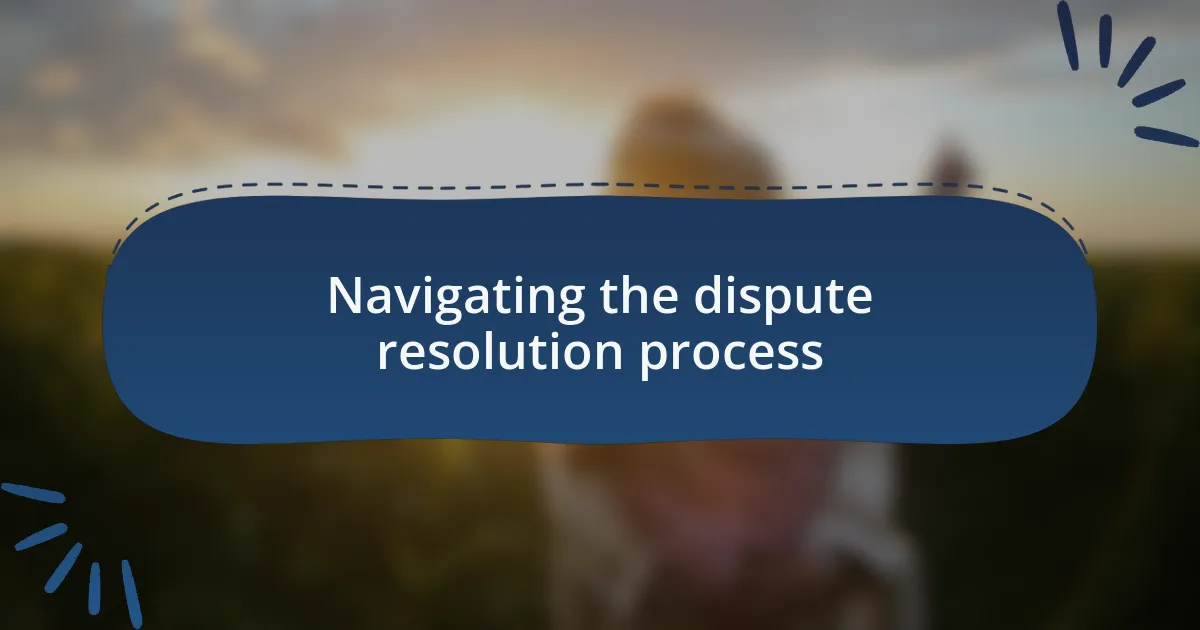
Navigating the dispute resolution process
Navigating the dispute resolution process can feel overwhelming, especially when emotions are running high. I remember sitting at the mediation table, my heart racing as I tried to articulate my concerns about the child’s well-being. It was a delicate balance between standing firm on key issues and remaining open to finding common ground. Have you ever felt torn between wanting to be assertive and fearing the potential fallout? It’s in those moments that I learned the power of patience and thoughtful communication, essential tools in a resolution setting.
During this journey, I discovered the value of active listening. In one particular session, I found myself genuinely hearing the opposing party’s perspective, which I hadn’t anticipated. It was eye-opening. I began to understand the complexities they faced, too. This didn’t change my stance, but my willingness to listen created a more constructive dialogue. Do you think empathy can coexist with assertiveness? From my experience, it absolutely can, and leaning into that duality facilitated a more productive negotiation.
Ultimately, I found that staying focused on the child’s best interests served as a guiding principle throughout the resolution process. I often repeated the mantra, “If it isn’t about the child, it isn’t worth the fight.” This perspective helped me to filter out distractions and maintain clarity in the discussions. Have you ever had to remind yourself of your core values in a heated situation? I realized that by centering my arguments on the child’s needs, I navigated the dispute with a sense of purpose, ensuring that every decision aligned with what was truly important.

Lessons learned from my experience
In reflecting on my experience, I learned that entering each discussion with a mindset of collaboration can shift the entire atmosphere. I recall a specific moment where, instead of rebutting an opposing argument out of frustration, I chose to frame my response as a question. Asking, “How do you think we can resolve this together?” surprisingly opened the door to more cooperative dialogue. Have you ever noticed how a simple change in approach can transform a tense situation?
Another key lesson involved the importance of documentation. Early on, I underestimated the power of having clear records to support my claims. But when I took the time to create a comprehensive timeline of events and communications, it not only helped clarify my position but also added credibility to my voice during negotiations. This made me wonder: how often do we overlook the small details that can bolster our case?
Perhaps the most profound insight I gained was the significance of emotional resilience. There were days when I felt overwhelmed by the stakes involved, and it took every ounce of strength to keep going. I learned that maintaining a healthy support system, whether through friends or professionals, was crucial during this challenging time. Have you ever felt that you were carrying too much on your own? Reaching out for help was invaluable, proving that vulnerability does not undermine strength; instead, it can be a powerful ally in navigating conflicts.